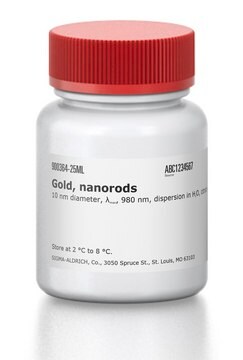716928
Gold nanorods
palladium coated, 25 nm diameter, 100 μg/mL in H2O, dispersion
Synonym(s):
Au nanorods, Gold nanorod
About This Item
Recommended Products
material
palladium
Quality Level
form
colloidal suspension
dispersion
nanorod
concentration
100 μg/mL in H2O
diam. × L
25 nm × 75 nm
diameter
25 nm
density
1 g/mL at 25 °C
storage temp.
2-8°C
InChI
1S/Au
InChI key
PCHJSUWPFVWCPO-UHFFFAOYSA-N
Looking for similar products? Visit Product Comparison Guide
Physical properties
Hazard Statements
Precautionary Statements
Hazard Classifications
Aquatic Chronic 3
Storage Class Code
12 - Non Combustible Liquids
WGK
WGK 3
Flash Point(F)
Not applicable
Flash Point(C)
Not applicable
Choose from one of the most recent versions:
Certificates of Analysis (COA)
Don't see the Right Version?
If you require a particular version, you can look up a specific certificate by the Lot or Batch number.
Already Own This Product?
Find documentation for the products that you have recently purchased in the Document Library.
Articles
Gold nanostructures such as nanorods, nanowires and microgold have found applications in exciting fields such as biomedical engineering, catalysis and diagnostics.
In many technologies, performance requirements drive device dimensions below the scale of electron mean free paths (λe). This trend has increased scientific interest and technological importance of electrical resistivities at the nanoscale.
Electronically, it behaves as a wide band gap (3.2 eV) semiconductor and exhibits memristor properties.2 Optically, TiO2 has high opacity with a very high refractive index3 (>2.4), and it exhibits strong absorbance in the UV range.
The past several decades have seen major advancements in the synthesis of metal nanomaterials. Most recently, controlled synthesis has become versatile enough to regulate the exact number of atoms and ligands of very small metal nanoparticles, referred to as “clusters”.
Our team of scientists has experience in all areas of research including Life Science, Material Science, Chemical Synthesis, Chromatography, Analytical and many others.
Contact Technical Service


